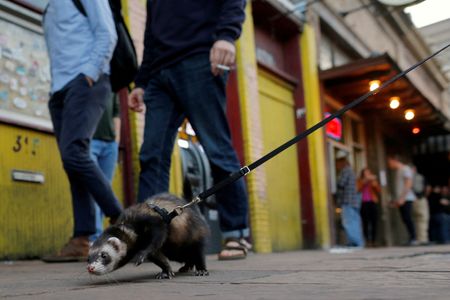By Nancy Lapid
(Reuters) – The bird flu virus strain that infected a Texas dairy farm worker in March was lethal to ferrets in experiments designed to mimic the disease in humans, the U.S. Centers for Disease Control and Prevention (CDC) reported on Friday.
Seasonal flu, by contrast, makes ferrets sick but does not kill them, the CDC said.
Ferrets are considered the best small mammal for studying influenza virus infection and transmission and are commonly used as a tool to inform public health risk assessments of emerging influenza viruses, according to the CDC.
The strain of the (A)H5N1 avian influenza virus found in Texas spread easily among healthy ferrets when they were placed in direct contact with infected ferrets, the researchers found.
The virus was less efficient than other influenza strains at spreading by respiratory droplets, however.
This suggests that viruses like this one “would need to undergo changes to spread efficiently by droplets through the air, such as from coughs and sneezes,” the CDC said.
Bird flu has been reported in more than 80 dairy herds across 11 U.S. states since late March. Scientists are on alert for changes in the virus that could signal it is adapting to spread more easily among humans.
Reuters reported earlier on Friday that U.S. federal and state agencies are planning research into potential respiratory spread of bird flu among dairy cattle in a move aimed at guiding efforts to contain the virus and reduce exposure to humans. Respiratory spread could give the virus more opportunity to evolve, they said.
The U.S., Mexico and Australia have reported a total of five human cases of different versions of H5 bird flu since March. The three U.S. cases were mild, with two dairy workers – one infected in Texas – experiencing just conjunctivitis, or pink eye, while a third case involved some respiratory symptoms.
The man in Mexico, who had other chronic conditions, died from multiple factors, the WHO said on Friday.
The new findings in ferrets “are not surprising and do not change CDC’s risk assessment for most people, which is low,” the agency said.
“The results do reinforce the need for people who have exposure to infected animals to take precautions and for public health and agriculture communities to continue to work together to prevent the spread of the virus to additional dairy herds and people.”
(Reporting by Nancy Lapid; Editing by Bill Berkrot)











